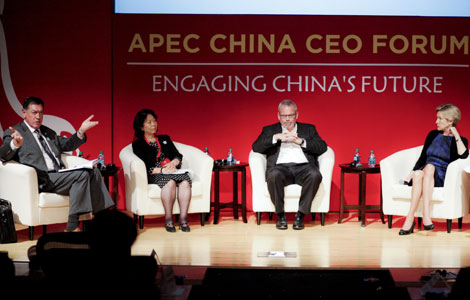RMB use is on the rise in US business
Updated: 2014-07-11 12:06
By Amy He in New York (China Daily USA)
|
||||||||
The use of the Chinese renminbi to settle trade between US and China continues to become more widespread, and US business leaders expect both their trade volume and RMB settlement to increase in the next year, according to an HSBC report.
More American businesses are using renminbi (RMB) to settle their trade and more plan to use it "amid expectations by business leaders that their trade with China will increase in the next 12 months", the bank said in its second annual RMB report.
The lender surveyed 1,304 international companies that conduct business with China mainland and found that of 102 US companies, 17 percent said they used RMB to settle trade this year. While that figure is lower than the global average - 22 percent - it is an increase from last year's 9 percent.
The US is now behind the French (26 percent) and German (23 percent) in RMB trade settlement outside of Chinese mainland, Hong Kong, and Taiwan, it said.
"As China continues to internationalize its currency, there are more opportunities and considerations in trade, investment, cash management and funding for US companies," said Steve Bottomley, senior executive vice-president of HSBC Bank USA, in a statement released Wednesday. "US businesses are becoming more comfortable using RMB and are increasingly making it, or looking to make it, a part of their competitive strategy and planning."
Companies in Hong Kong and China say that foreign firms settling trade in RMB receive financial advantages, such as transactional discounts, HSBC said.
The US trails its European competitors, however, in overall RMB trade settlement, mostly due to the strength of the dollar and convenience of trading in the world's reserve currency. Compared to last year's survey results, the percentage of German businesses using RMB jumped to 23 percent this year from 9 percent in 2013, HSBC numbers show.
"I think US companies will need to be competitive with their European counterparts, so we expect that US businesses remain competitive and to react to the same market forces, which may mean adopting renminbi settlements," Martin Brown, executive vice-president of HSBC Bank USA, told China Daily.
"Many of our European clients are trading in multiple currencies, but in the US, many people continue to settle trade in US dollars. US companies have not been as active in the foreign-exchange market as international companies because of greater reliance on the dollar," he said.
HSBC's findings mirror RMB trade data released by the Society for Worldwide Interbank Financial Telecommunication (SWIFT) in June. The Belgium-based financial services company launched its RMB tracking service three years ago to monitor the global flow of RMB as the Chinese government liberalized its currency as part of its policy to let the market exert bigger influence over the economy.
SWIFT data showed that "RMB growth is gaining traction in non-traditional clearing centers, such as the United States" and that United States RMB payments value increased 327 percent between April of last year and April of this year.
"Although the corridor remains dominated by the US dollar, data suggests that the United States is increasingly using the RMB to support its corporates that want to reach more suppliers in China mainland. This is good news for the internationalization of the RMB as a world payments currency," said Michael Moon, head of payments in the Asia Pacific at SWIFT.
The increased international use in RMB is good for Chinese companies as well, since it reduces chance of currency fluctuation.
"That's one of the advantages US companies have from the dollar being the international currency - a lot of times both their expenditures and revenues are in dollars, so you don't have to worry about depreciation or appreciation radically altering your underlying financial situation," said Nicholas Borst, research associate for the Washington-based Peterson Institute of International Economics.
"So for Chinese companies, they don't have to worry about whether the amount of dollars they're going to be paid back in are going to be worth more or less depending on what's going on with the renminbi. If they can just switch to being reimbursed to renminbi in the first place, it makes planning from a corporate perspective a lot easier," he said.
amyhe@chinadailyusa.com
(China Daily USA 07/11/2014 page1)

 Messi, Neymar, Rodriguez among Golden Ball nominees
Messi, Neymar, Rodriguez among Golden Ball nominees
 APEC forum attracts Pacific Rim leaders
APEC forum attracts Pacific Rim leaders
 Hacker Attack Memorial Hall's website
Hacker Attack Memorial Hall's website
 M.Y. China: Tradition with a twist
M.Y. China: Tradition with a twist
 CARE marks 4th of July with charity fundraiser
CARE marks 4th of July with charity fundraiser
 Hainan Airlines provides limo service in US
Hainan Airlines provides limo service in US
 Chinese-American hoopster makes history
Chinese-American hoopster makes history
 Hit play returns to US for a second run
Hit play returns to US for a second run
Most Viewed
Editor's Picks

|

|

|

|

|

|
Today's Top News
Bus carrying Chinese tourists crashes in US
LeBron James back to Cleveland
China, US pledge partnership
RMB use is on the rise in US business
Chinese see NYC real estate as a sound place
Australia is top destination for wealthy Chinese
Berlin expels US spy official
China-US investment treaty on fast track
US Weekly

|

|







